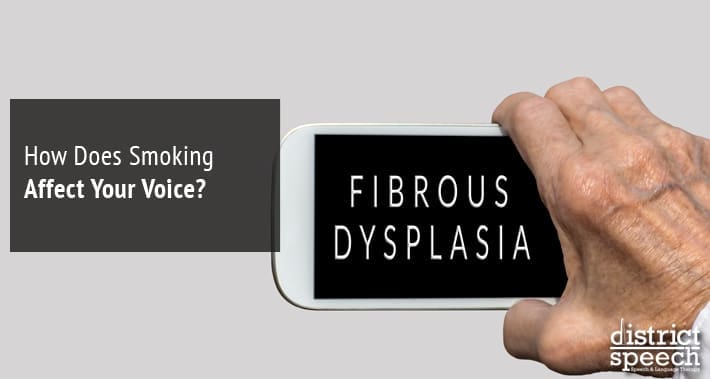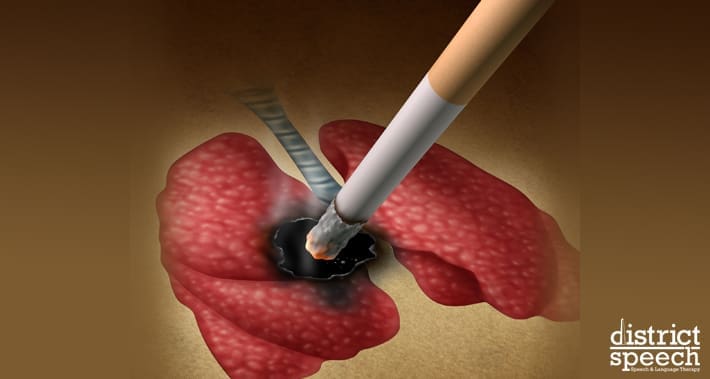
There are a lot of side effects of smoking.
Some which probably come to mind immediately include lung cancer, heart disease, asthma, and stroke.
And these are pretty serious.
One which might not immediately spring to mind is the way smoking can impact your voice.
And although changes in your voice might not seem very serious on the surface, they can point to some more serious, underlying changes.
If you are noticing vocal changes due to smoking, you may want to seek out a DC speech therapist to help prevent those changes from becoming permanent.
Let’s take a close look at the effects of smoking on your voice.
What Is “Smoker’s Voice”?
“Smoker’s voice” is a result of the effects of cigarettes on your vocal folds (or more commonly known as vocal cords).
This is a change which can result in a deeper, “raspier” voice.
Some people may think a raspy voice is “sexy”.
After all, Cher, Stevie Nicks, and Amy Winehouse all have raspy voices.
However, it’s important to remember that vocal changes due to smoking can have long term, damaging, effects.
Effects that may not be worth the “raspiness” some people seem to desire.
What Does Smoking Do To Your Voice?
When you smoke, your larynx and lungs are exposed to chemicals, allergens, and irritants.
These chemicals and allergens from smoke can cause changes to your voice.
This can lead to chronic laryngitis and chronic coughs both of which are bad news for your voice.
Let’s take a closer look at some of the other ways smoking can affect your voice.
1. It Causes Vocal Fold Irritation And Inflammation
When you smoke, it causes your vocal folds to become irritated and inflamed.
Smoking also results in your throat becoming dried out.
Without proper lubrication the vocal folds don’t vibrate as they would be expected to.
Furthermore, smoking can lead to acid reflux, which can also cause irritation to your vocal folds.
As you can imagine, damage to the vocal folds will have an impact on how you sound.
2. It Reduces Your Lung Capacity
There’s a pretty good chance you’ve seen images of a healthy lung versus a smoker’s lung.
The nice, pink, normal sized organ beside a blackened, larger than average (due to inflammation) lung.
Reduced lung functioning and lowered lung capacity due to smoking means you don’t get as much airflow going through your vocal folds as a non smoker would.
This lack of airflow can affect the sound of your voice.
3. It Can Cause Reinke’s Edema
Reinke’s space is to the non muscle space between the vocal ligaments and mucosa of the vocal cords, located under their surface.
It’s not an empty space, per se.
It contains a combination of cells and fibers, and is important to the vibration of your vocal cords.
When swelling occurs in this area, it’s called Reinke’s edema.
As a result of Reinke’s edema, your vocal folds become waterlogged, and don’t vibrate very well.
This lowers the pitch of your voice and can make it gravelly.
4. It Can Cause Vocal Fold Polyps And Nodules
Vocal fold polyps and nodules are growths that can form on your vocal folds.
Smokers are more likely to have these growths form on their vocal folds.
Nodules are hardened, similar to a callous, while polyps are larger and similar to a blister.
When polyps or nodules form on the vocal folds, they can lead to changes in the tone and quality of your voice.
The result is a hoarse sounding voice, lowered pitch and a rough quality to the voice.
Although smoking is not the only cause of growths on the vocal folds, these bumps are more likely to be cancerous if you are a smoker.
Large polyps can also result in breathing difficulties if they get to a point where they’re blocking your airways.
5. It Can Cause Cancer
When you think of cancer and smoking, your first thought is probably lung cancer.
However, smoking can lead to cancer almost anywhere in the body, not just your lungs.
Smoking can cause abnormal cell development, also known as dysplasia, in your vocal folds, leading to voice changes.
Cancer of the larynx and throat can also lead to vocal changes.
6. It Can Lead To A Smoker’s Cough
One of the most recognized external characteristics of smoking is a “smoker’s cough”.
This occurs as a result of the effect of smoke on the small, hair like structures called cilia in your airway.
The role of cilia is to control the build up of phlegm.
When they are damaged by smoke, they lose their ability to perform this task.
As a result, your body will attempt to expel phlegm by coughing instead.
Constant coughing can be traumatic for your vocal folds and can lead to hoarseness in your voice.

Does Cannabis Have The Same Effect?
If you smoke cannabis, you might be wondering if you’re also at risk for vocal changes.
At this point, the verdict on the effect of cannabis on your vocal cords is still out.
A 2005 study found that cannabis smoke isn’t as carcinogenic as tobacco, but that doesn’t mean it doesn’t cause any damage.
In general, people smoke more tobacco in a day than they do cannabis, so that can be a contributing factor.
Overall, more research needs to be done to determine the effects of cannabis on your vocal folds.
But a general rule of thumb is that inhaling smoke of any kind isn’t good for your voice.
Does Vaping Have The Same Effect?
If there isn’t very much research on the effects of cannabis smoking on your vocal cords, then there is even less on the effects of vaping.
The vaping industry is much newer, compared to cigarettes and cannabis.
Furthermore, it’s not very well regulated, and different products often contain different chemicals.
As well, vaping products and e cigarettes tend to be marketed towards a younger population.
They are popular among middle and high school students.
Unfortunately, younger populations are at a greater risk of long term effects to their voice.
This is because their larynxes haven’t fully finished developing yet.
Little is known about its effects of vaping on your vocal cords at this point.
Will Your Voice Improve If You Quit Smoking?
You’ve probably heard many of the reasons to quit smoking.
You’ll smell better, you greatly reduce your risk of many cancers, and you can save all of that money you were spending on cigarettes.
But if you’re worried about your voice changing, this is another great reason to kick the habit.
Most people will star to notice differences in their voice within just a few weeks of quitting smoking.
However, depending on how much damage has been done, it could take a few months for the irritation of your vocal folds and voice box to go down.
If you need support quitting smoking, DC Quitline here in Washington DC can help.
Book Your Appointment With District Speech Today
Are you worried about vocal changes due to smoking?
Does your singing voice not sound quite the way it used to?
Perhaps you’re trying to kick the habit and want to get a head start on getting your voice back.
Or maybe you’re in the process of quitting, but want to take proactive steps to protect your voice.
No matter the reason, we’re District Speech, and we can help.
Offering speech therapy services for smokers and non smokers alike in Washing DC and the surrounding areas, we can help you address any concerns you might be having with your voice.
Book your appointment with us today, and make the first step to getting your voice back.
1300 I St NW, Suite 400 E,
Washington, DC 20005
- https://g.page/districtspeech
District Speech and Language Therapy specializes in speech therapy, physical therapy, and occupational therapy solutions, for both children and adults, in the Washington D.C and the Arlington Virginia areas.